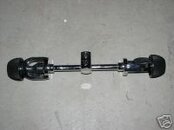Bill Fisher
Contributor
Do more divers using doubles prefer the isolation manifold over
independent doubles ?
I'm still uncertain for myself, but one quote keeps coming back to me, it's from the book "Complete Wreck Diving" by Henry Keatts & Brian Skerry.
After reading the passage from the book, please tell me why you prefer an isolation manifold over independent doubles....or vice versa.
I know this has been covered a ton, so please either reply or ignore.
Thanks. Bill
"With the basic double manifold design,a single regulator is used eliminating the need to switch regulators during the dive. The obvious downside to this is the lack
of redundancy. Should the manifold or regulator malfunction, there are no options. An example of just how dangerous this lack of redundancy can be is illustrated in a story told by Larry Keene of Ocean City, MD.
"While diving the wreck of the U-853 off Block Island several years ago, I had a first hand lesson in the importance of a back-up system. I was exploring inside the foward torpedo room when in the confined space, I rubbed against some sharp jagged metal which sliced my regulator hose in two. Alll the air in my double tanks completely drained out in seconds. I forced myself not to panic, exited the loading hatch and saw my buddy approximately 30 feet away. I had two choices, swim to him or the surface. I made the decision to swim to him and buddy breath. I made it to him, and we were able to buddy breath to the surface. I'm lucky I did not have to decompress. From that moment on I never went diving without a redundant system"
The author doesn't go on to say what type of redundancy,
independent doubles or a pony in addition to the manifold doubles he uses ???
independent doubles ?
I'm still uncertain for myself, but one quote keeps coming back to me, it's from the book "Complete Wreck Diving" by Henry Keatts & Brian Skerry.
After reading the passage from the book, please tell me why you prefer an isolation manifold over independent doubles....or vice versa.
I know this has been covered a ton, so please either reply or ignore.
Thanks. Bill
"With the basic double manifold design,a single regulator is used eliminating the need to switch regulators during the dive. The obvious downside to this is the lack
of redundancy. Should the manifold or regulator malfunction, there are no options. An example of just how dangerous this lack of redundancy can be is illustrated in a story told by Larry Keene of Ocean City, MD.
"While diving the wreck of the U-853 off Block Island several years ago, I had a first hand lesson in the importance of a back-up system. I was exploring inside the foward torpedo room when in the confined space, I rubbed against some sharp jagged metal which sliced my regulator hose in two. Alll the air in my double tanks completely drained out in seconds. I forced myself not to panic, exited the loading hatch and saw my buddy approximately 30 feet away. I had two choices, swim to him or the surface. I made the decision to swim to him and buddy breath. I made it to him, and we were able to buddy breath to the surface. I'm lucky I did not have to decompress. From that moment on I never went diving without a redundant system"
The author doesn't go on to say what type of redundancy,
independent doubles or a pony in addition to the manifold doubles he uses ???





